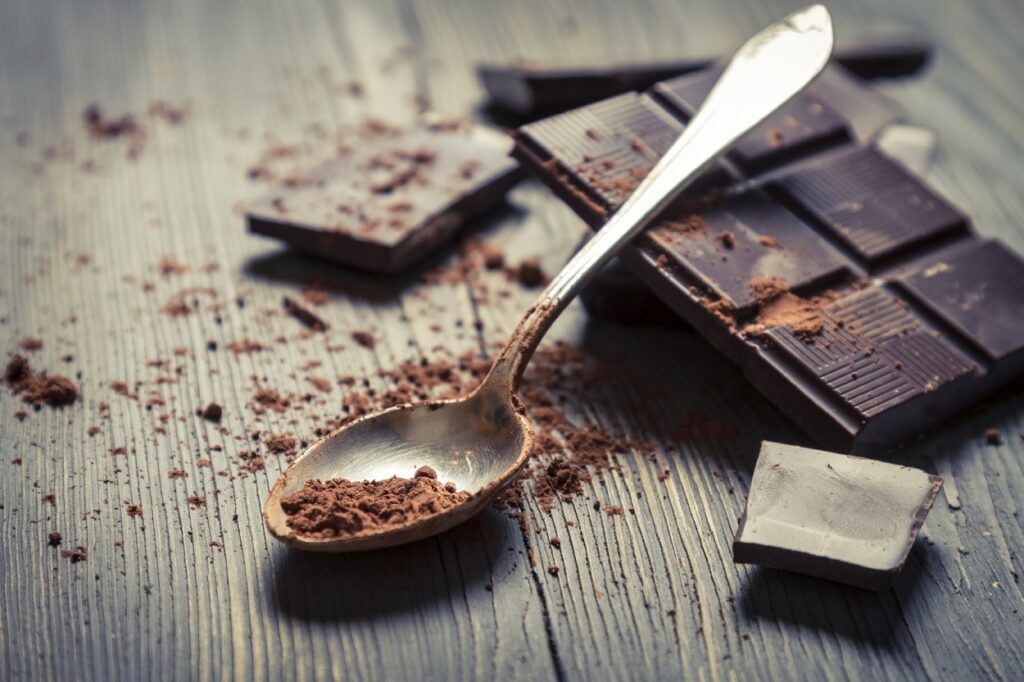In this series we look at an aspect of science that gets too little (in our view) attention in business and that’s what we eat, how we move our body and use our brain. Take a look at the whole series here!
Rejoice, rejoice: chocolate is actually good for you.
Here is just some of the evidence.
Researchers at the University of Aberdeen found that eating up to 100g of chocolate a day lowered the risk of dying from heart disease by 25% and reduced the risk of suffering a stroke by 23%.
Professor Phyo Myint, Chair in Old Age Medicine at Aberdeen University, said: “Cumulative evidence suggests that higher chocolate intake is associated with a lower risk of future cardiovascular events.”
But please note 100g is a lot and you will be consuming rather a lot of calories too – about 500 calories.
Whilst the Aberdeen study suggests milk chocolate works well for heart and stroke risk reduction, most research points to dark high quality chocolate for maximising health benefits.
This study demonstrated the role of cocoa flavanols in preventing cognitive decline and other recent findings have linked chocolate to migraine treatment, improved cardiovascular health, reduced inflammation in the lower intestines, lowered blood pressure, reduced risk of colon cancer, strengthened cell membranes, protection from liver damage and disease and prevention of blood clot formation.
With this list it’s hard not to be rushing out to buy a large bar!
The cacao bean
It is believed that these benefits come because the cacao bean is high in anti-oxidants. On the ORAC scale (the measure used by scientists to determine the anti-oxidant content of food), raw cacao beans are amongst the highest scoring foods ever tested (above blueberries, for example).
Apart from anti-oxidants other beneficial elements may also be providing help to health.
A review published in the Journal of Alzheimer’s Disease suggests that chocolate contains nutrients which could prevent age-related neuro-degenerative disorders like Alzheimer’s. The author Dr Giulio Maria Pasinetti, professor of neurology in New York, has shown that some forms of cocoa extract could reduce the risk of dementia, or at least did in animals.
Recent findings have linked chocolate to migraine treatment, improved cardiovascular health, reduced inflammation in the lower intestines, lowered blood pressure and more.
These studies focused on chemical compounds in cocoa known as polyphenols which help clear harmful proteins that collect in the brain, and can cause Alzheimer’s.
There is a lot more research to be done but for those of us worried about cognitive decline this is interesting. And other research has found that chocolate enhanced attention and cognitive ability
So what are these polyphenols?
They are micronutrients in our diet, found widely in plants and have an anti-oxidant effect. They protect plants from ultraviolet radiation and infection – and, increasingly, research shows they protect people too!
You will be familiar with the taste which is astringent and found in fruits like grapes, apple, pear, cherries, pomegranates and berries. Tannins – which give tea, chocolate and red wine their distinctive flavour – are a subset of polyphenols.
Raw chocolate can’t be heated above 45 degrees – enabling it to better preserve its nutrients which include iron, calcium, zinc and magnesium.
It’s interesting that wine is a rich source of these health-boosting anti-oxidants.
But back to what chocolate to eat…
Medical advice says go for dark chocolate – above 70% cocoa solids and check the flavanol content, which varies from brand to brand, and sometimes even batch to batch (because the chocolate refining process strips cocoa of its naturally occurring antioxidants in different ways, I’m told.)
And then there’s the raw vs processed debate. Most chocolate is made by roasting the beans at a very high temperature. Raw chocolate can’t be heated above 45 degrees – enabling it to better preserve its nutrients which include iron, calcium, zinc and magnesium.
So the good news is that science says eat some dark high quality chocolate regularly and you have no need to feel guilty.






One Response
Great news for chocolate
Great news for chocolate lovers who enjoy a glass of red wine
What about staining your teeth though?